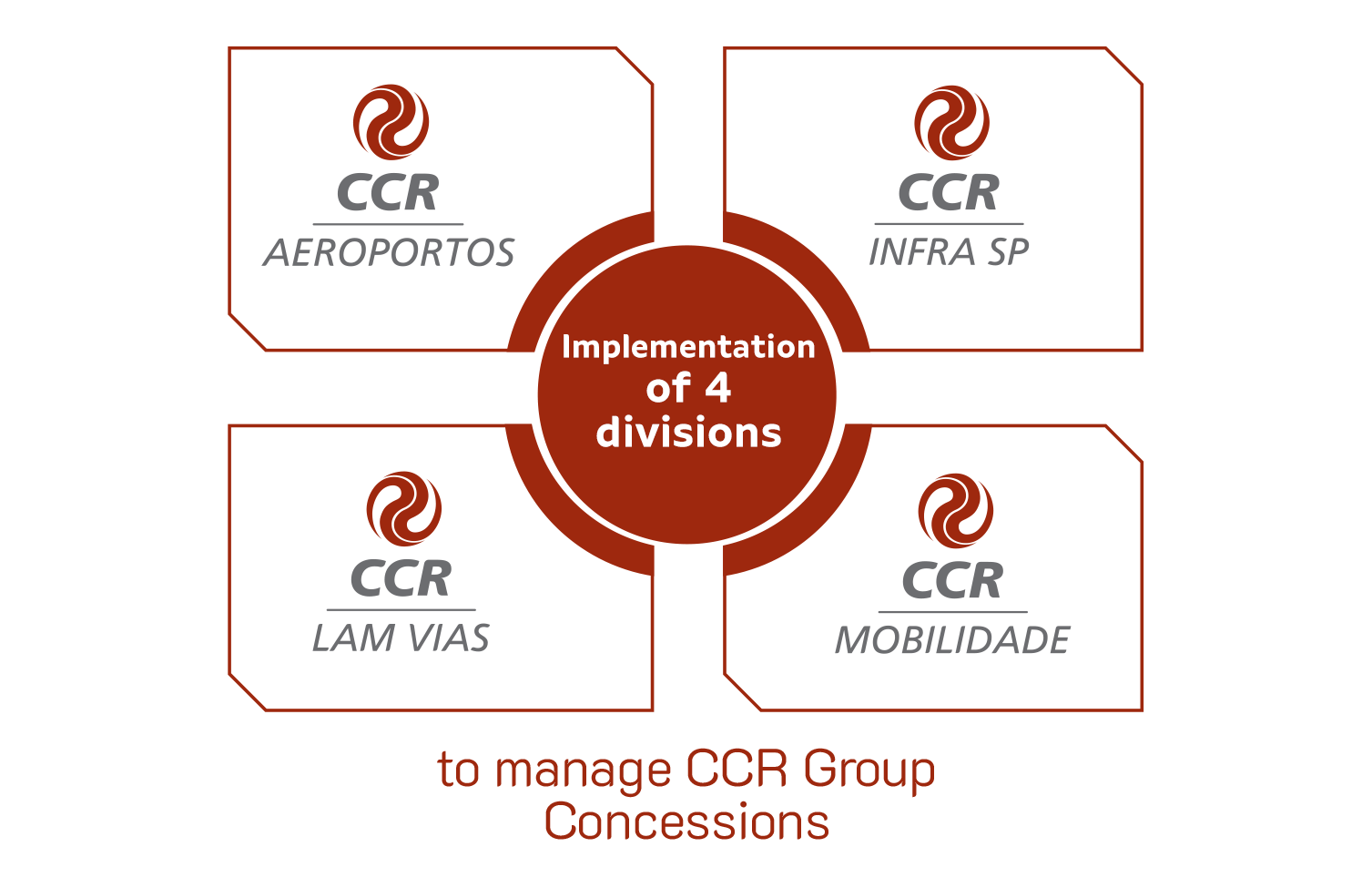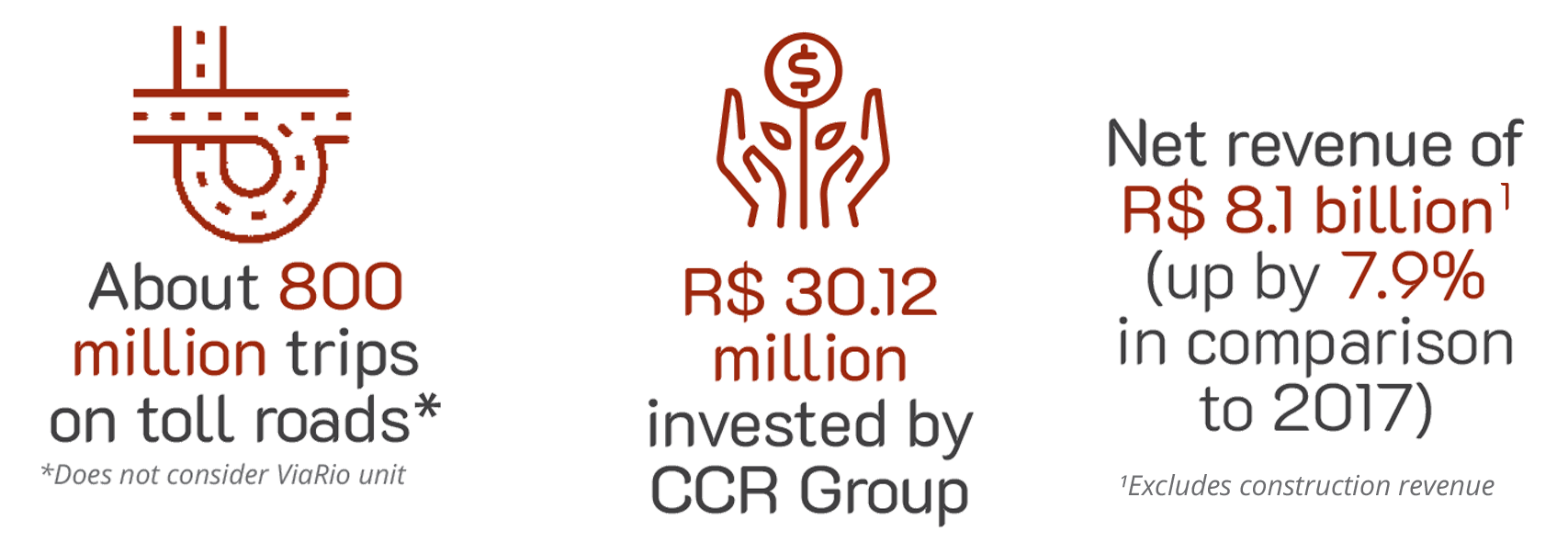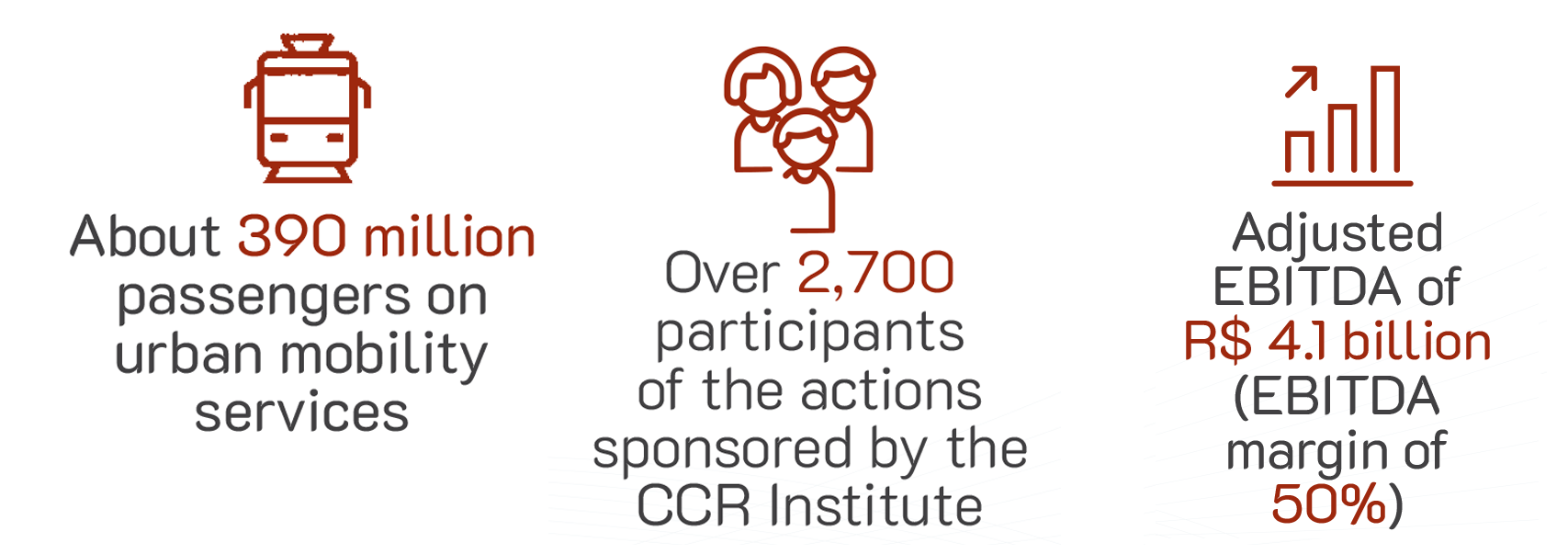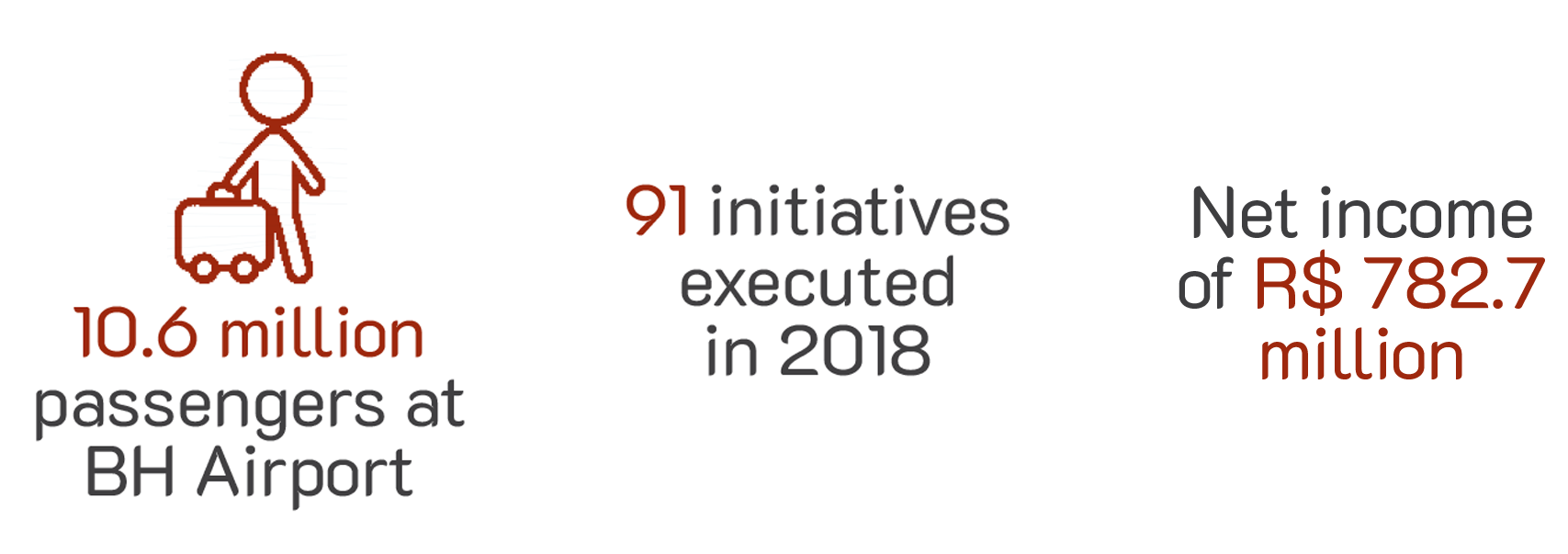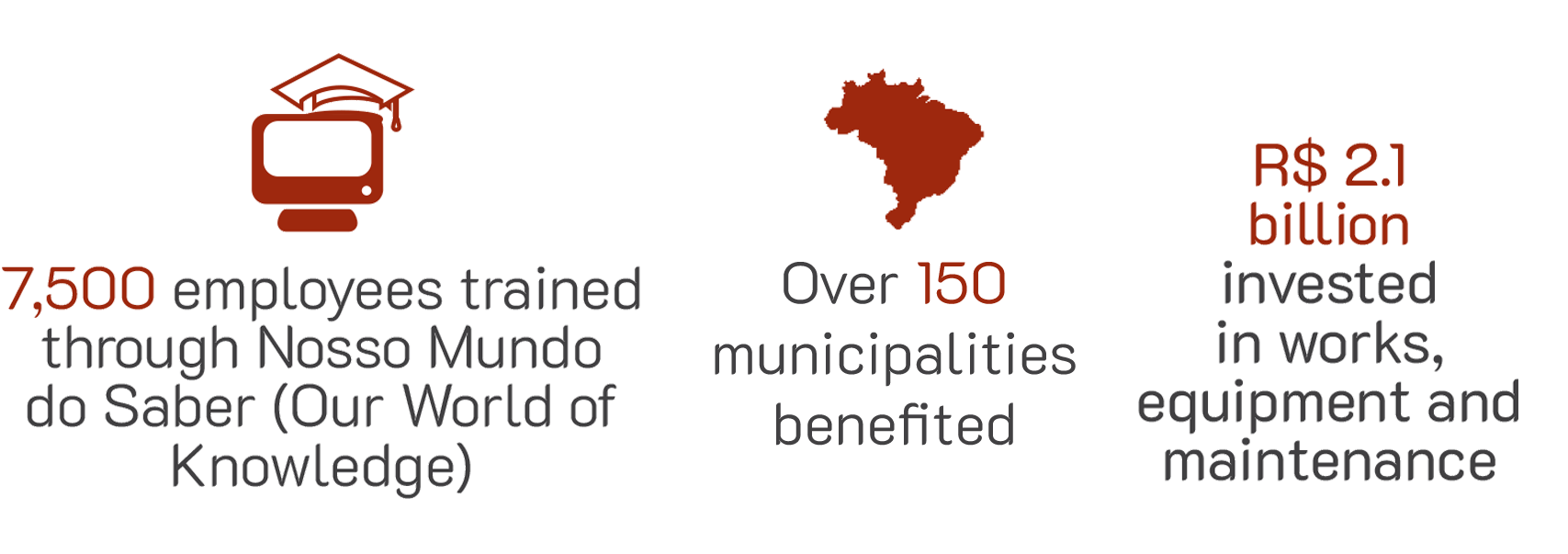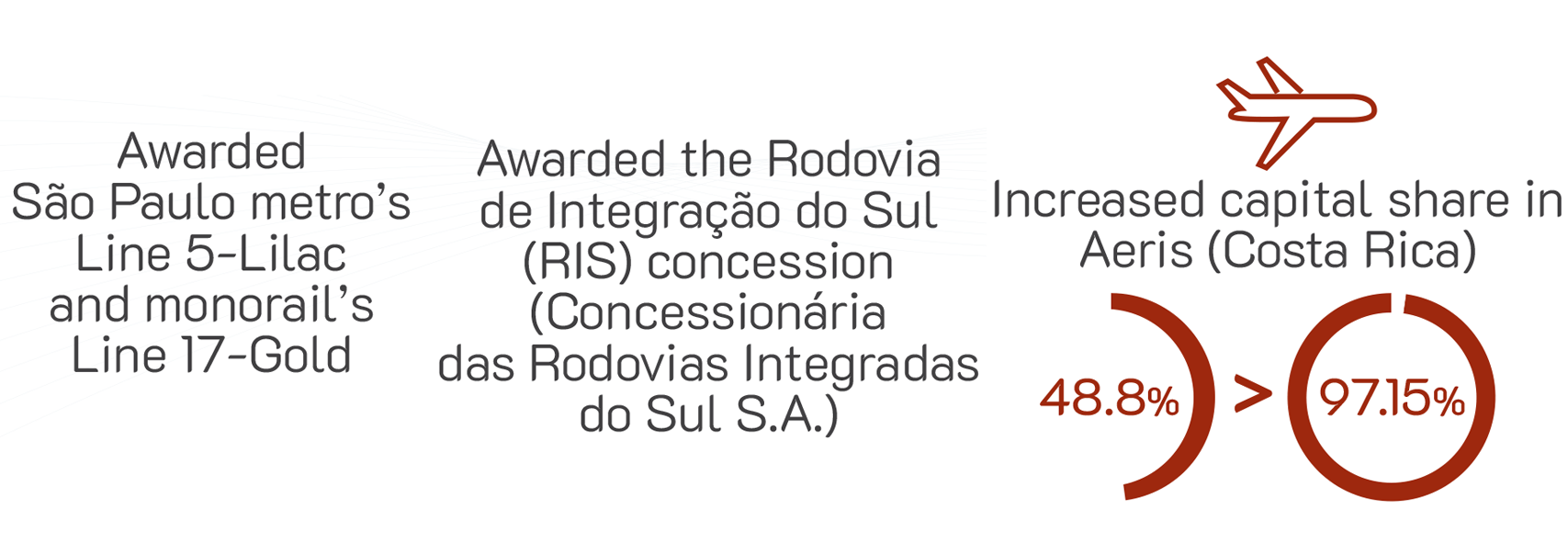CCR Group history
The history of CCR Group has progressed together with the development of Brazil's infrastructure concessions program. In 20 years, the company has contributed to the generation of wealth and the sustainable development of Brazil.
-
1995
At 13.2 kilometers long, the Rio-Niterói Bridge (BR 101-RJ) was the first federal highway concession given to a private company. CCR Ponte began the 20-year contract on June 1, 1995, making important investments to improve traffic and safety conditions between the Rio de Janeiro's two main economic centers.
-
1996
CCR NovaDutra was given a 25-year concession for a stretch of highway between Rio de Janeiro and São Paulo on the BR-116 Highway. Since then, the concessionaire has invested over R$ 5.8 billion in projects that include paving, new pedestrian overpasses, bridges and viaducts. That same year, CCR ViaLagos, which mangers the Lagos Highway (RJ-124), was constituted. This toll road, which connects the main tourism regions of the state of Rio de Janeiro, was doubled in size and extended to the municipality of São Pedro da Aldeia.
-
1997
The CCR came to Paraná with CCR RodoNorte. Over a total of 487 kilometers of managed roadways, the company made investments to improve traffic conditions in one of the biggest agricultural and industrial hubs in the country.
-
1998
CCR grew its operations in the State of São Paulo, with the arrival of CCR AutoBAn, in charge of managing the Anhanguera-Bandeirantes system. The investments made in this complex, from approximately R $ 7.6 billion until 2018, have turned the toll roads into a quality reference for users. That same year, CCR ViaOeste (then owned by other shareholders) acquired a concession for the Castello-Raposo system, the main axis connecting the capital with western São Paulo. Around 600,000 vehicles per day travel along its approximately 170 kilometers.
-
1999
The shareholders that held the participation in the federal and state highway concessions CCR AutoBAn, CCR NovaDutra, CCR RodoNorte, CCR ViaLagos and CCR Ponte created the CCR Group, which now holds a direct stake in these companies. This was how the holding was formed, set up to make solutions feasible for investments and services in infrastructure and to contribute to Brazil's sustainable growth.
-
2000 a 2002
CCR Group received registration to become a publicly traded company from the Comissão de Valores Mobiliários – CVM (Brazilian Securities and Exchange Commission) in December 2000. In a pioneering movement in the Brazilian capital market, in November 2001 it became the first company to join the recently-created Novo Mercado, a special segment listing a group of companies with the highest standards of governance and shareholder relations. In February 2002, trading of CCR Group shares began on the Stock Exchange (Bolsa de Valores- B3 S.A.). In 2002, CCR Actua and CCR Engelog were created, with the goal of contributing to CCR Group's growth and reinforcing competitiveness for new business.
-
2005
CCR Group increased its operations in the State of São Paulo with the acquisition of CCR ViaOeste concessionaire, which manages 168 kilometers of toll roads, including stretches of Castello Branco and Raposo Tavares.
-
2006
CCR Group diversified its business and was awarded a concession to operate São Paulo Metro Line 4-Yellow, through the consortium winning the first Public-Private Partnership (PPP). The unprecedented partnership model between the grantor authority and private initiative made ViaQuatro viable, one of the most innovative companies, recognized for the quality of service provided in urban mobility systems. Every day, around 750,000 passengers move through the 10 stations managed by the concession. CCR EngelogTec was created to centralize activities and manage information technology for CCR Group units, following the same concept of efficiency and cost optimization of CCR Engelog and CCR Actua. These three units then formed the Shared Services Center, giving the company a major competitive edge.
-
2007
The CCR Nucleus Infrastructure and Logistics, in partnership with the Foundation Dom Cabral, is inaugurated. With the objective to be a dynamic space of generation of knowledge, contributing to the discussions on the concession models and the role of the initiative private transport Brazilian.
-
2008
CCR Group acquires 40% of the capital stock of Renovias and wins the bid to operate the western section, 32 kilometers from the Mário Covas ring road, which connects the Raposo Tavares, Castello Branco, Anhanguera, Bandeirantes and Régis Bittencourt, constituting CCR RodoAnel Oeste concessionaire. Around 245,000 vehicles per day travel along this toll roads, which helps to ease traffic congestion in the city of São Paulo.
-
2010
CCR Group acquires the entire share capital of SPVias, which had managed a toll road system of 516 kilometers in São Paulo since 2000, forming CCR SPVias. The unit is responsible for managing the main link between the state capital, the southwestern region of the State, and the States of Paraná and Mato Grosso do Sul. It also begins the operation of the Paulista and Faria Lima stations of Line 4-Yellow.
-
2011
SAMM begins its activities in the telecommunications segment, with data transmission in high capacity through fiber optics.
-
2012
A year of major achievements for CCR Group. The company acquired a 45.49% stake in Quiport, a concessionaire that manages Quito International Airport in Ecuador, and begins its internationalization plan. Next, the company purchased a 48.75% capital stake in Aeris, the concessionaire for the San Jose International Airport in Costa Rica. And, before the year ended, CCR Group went on to hold 40.8% of the concession in the International Airport of Curaçao. In Brazil, it signed a contract to implement, operate and maintain ViaRio, part of a package of investments planned for the 2016 Olympic Games in Rio de Janeiro. The 13-kilometer stretch connects the Deodoro neighborhood with Barra da Tijuca (Corredor Expresso Transolímpica). In the mobility segment, the holding company acquired an 80% stake in CCR Barcas, which carries passengers across waterways transportation in the state of Rio de Janeiro. Since the start of this concession, R$ 75 million have been invested in new vessels, refurbishment of shipyards and other improvements to increase safety and service quality.
-
2013
CCR Group makes advances in the mobility segment. First, it entered the winning consortium to implement and operate VLT Carioca, an innovative passenger transport model connecting Rio de Janeiro's port region and downtown. In October, through Metrô Bahia, a concession contract was signed to execute a metro system between Salvador and Lauro de Freitas, in Bahia. The PPP regime establishes works to be carried out, provision of rolling stock and system expansion.
-
2014
In April, a consortium in which CCR Group is a participant took over a concession to expand, maintain and operate Confins International Airport, in Minas Gerais. This kicked off the start of BH Airport, which has already invested R$ 1 billion in one of the country's biggest airport terminals. CCR Group is awarded a concession for BR-163/MS, forming CCR MSVia. The contract was executed in March and began work to double the toll roads, along with other improvements benefitting 19 municipalities in Mato Grosso do Sul. This was also the year when CCR Institute was created. The organization began with the purpose of managing social investments for CCR Group, aimed at promoting local development using company resources and tax incentives.
-
2015
CCR Group grew its foreign operations portfolio by purchasing a 70% share in Total Airport Services (TAS), a provider of airport services operating in the USA. It also increased its share in Quiport, managing the airport in Quito (Ecuador), to 50%. On May 31, CCR Ponte, the concessionaire responsible for the management of Rio-Niterói Bridge, came to an end after providing services to users for 20 years. The end of the first concession contract executed proved the success of the partnership established between the grantor authority and private initiative.
-
2016
CCR Group, along with its partners, finalizes the sale of Sociedade de Tecnologias de Pagamento S.A. (STP), a means of electronic payment for tolls and parking known under the Sem Parar brand. The company received R$ 1.4 billion for its share in the company, reinforcing its strategy of qualified growth.
-
2017
In line with the growth plan, CCR Group increased its share in two concessionaires. Investments made resulted in the company holding a 75% share in ViaQuatro, managing São Paulo Metro Line 4-Yellow, and a 66.66% share in ViaRio, in Rio de Janeiro. Internally, CCR Group began a plan to reorganize the asset management structure. Creation of four new divisions was announced to the market, to manage toll road assets in São Paulo state, other state and federal roads, urban mobility systems and airports.
-
2018
This was a year of new and important concessions for CCR Group. In the urban mobility segment, the company won a tender to operate and maintain São Paulo metro's Line 5-Lilac and monorail's Line 17-Gold, both operated by ViaMobilidade. In November, it was awarded a concession for the Rodovia de Integração do Sul (RIS), an important connecting road in the state of Rio Grande do Sul, with CCR ViaSul being established. CCR Group also increased its capital share in Aeris (managing the airport in Costa Rica) to 97.15%. It therefore consolidated its position as an international airport operator in the Americas.

